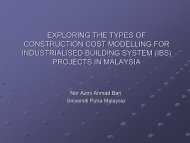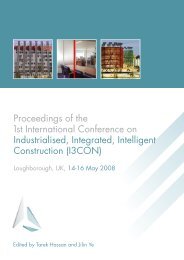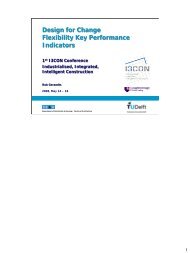Industrialised, Integrated, Intelligent sustainable Construction - I3con
Industrialised, Integrated, Intelligent sustainable Construction - I3con
Industrialised, Integrated, Intelligent sustainable Construction - I3con
You also want an ePaper? Increase the reach of your titles
YUMPU automatically turns print PDFs into web optimized ePapers that Google loves.
SUSTAINABLE CONSTRUCTION HANDBOOK 2<br />
Figure 4. Questionnaire one and two: Comparison between the organisations management of<br />
sustainability responsibilities<br />
The results showed that 76% of FM have some level of formal or informal management of <strong>sustainable</strong><br />
activities. 16% of FM respondents have no management responsibility regarding <strong>sustainable</strong> activities<br />
of their organisations. This figure is less than the number of respondents who rated their organisations<br />
as either inconsistent or poor in terms of managing their sustainability responsibilities; whether this is<br />
due to them not having full remit over those responsibilities, experiencing hindrance in that role or<br />
rating their own performance as badly is uncertain. There is also a link with the level of responsibility<br />
of the FM and the barriers preventing effective management of sustainability responsibilities. Greater<br />
levels of FM responsibility result in fewer barriers to effective sustainability management, especially<br />
when assigned to dedicated staff/teams. Formal management of sustainability reduces barriers and<br />
increases organisational sustainability management effectiveness.<br />
Barriers to Effective Management of Sustainability<br />
The organisations responding to the BIFM questionnaire regard financial constraints (40%) as the<br />
biggest barrier along with time constraints (38%) and lack of senior management commitment (37%)<br />
ranking highly. Many organisations still regard <strong>sustainable</strong> activities as cost overheads rather than<br />
calculating the benefits of efficiency. FM professionals are often at a low level in the organisational<br />
hierarchy and require senior management commitment to implement new working technique and<br />
ideas. Customer constraints and lack of tools are not regarded as significant barriers within the<br />
respondent organisations. Lack of knowledge and training of the FM are significant barriers and ones<br />
that should be overcome with better education and stronger sustainability goals.<br />
Figure 5 highlights construction organisations as having significantly higher percentages in most<br />
categories. This shows the increased barriers within the construction industry. Time constraints are the<br />
most significant barrier within construction firms (67%) along with customer constraints (57%) and<br />
financial constraints (52%). In comparison, the organisations responding to the BIFM survey gave<br />
results of 38%, 14% and 40% respectively. This links with the customer orientation of the industry<br />
where the client demands a bespoke product which must be provided within the period of time stated<br />
by the contract and within the budget set upon tendering. New initiatives such as sustainability in<br />
construction would experience similar limitations. Lack of awareness of the parties involved features<br />
in low proportions to other barriers. These respondents also lack the knowledge and training required<br />
to effectively manage sustainability. As there is no clear definition of what sustainability actually is or<br />
how to implement it, there is widespread debate on what organisations should be doing to achieve it.<br />
This theory links to the barriers and the range of aspects within organisations sustainability policies.<br />
224






